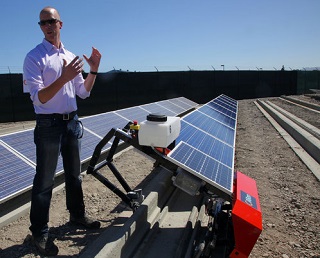Talkin’ Up Energy at the International Trade Forum

Everyone who speaks in public harbors at least some level of fear that they’ll be telling the audience something they already know; it’s more than a little irksome to look out at the audience and see people rolling their eyes.
I combat this by making my talk (when I think it’s appropriate) a torrent of high-level concepts, never staying too long on one point. I suppose it’s a lot like this blog. If you want the technical details of building a cadmium telluride solar PC cell, you’ll have to look elsewhere. In about 30 minutes, I’d covered everything from the validity of advanced nuclear, to the economics of cleantech, to the terror that we should all have about the fantastic amount of coal being burned in India and China, to the 14 reasons that clean energy can’t lose (to steal from the subtitle of Bullish on Renewable Energy).
At a certain point in the presentation, I like to reduce the whole argument to its simplest terms: our modern society is on a collision course with disaster, and, though many people understand this, humankind is having trouble coming together and making the sacrifices necessary to get our civilization back on course towards sustainability. Like the substance abuser, we have a high “discount rate,” as the economists like to say; i.e., we’re unwilling to suffer minor deprivation today in order to ensure our long-term health. We know what we’re doing is wrong, but we do it anyway.
In my mind, it’s a matter of defining precisely who we are. This, as I pointed out in my talk, is especially important as we approach the U.S. presidential election campaign. Here we have a political discussion that has brought us down to our basest instincts: selfishness, greed, bigotry, elitism, and fear of the “other.” There is essentially no other narrative, one that would talk about aspiring to the higher ideals of humankind: compassion, cooperation, and acceptance of people who don’t look like us. It’s particularly disgusting that this is happening in the U.S., with our rich history of fairness and providing everyone with a fair shot at success.
In other words, we’re taking this whole conversation in precisely the opposite direction from the one we’re going to need for our own survival.
The good news is that the forces of pure market economics are rapidly making fossil fuels obsolete, which will greatly reduce the threat of climate change, ocean acidification, loss of biodiversity, and the attack on human health. We are going to get there; the question, of course, is how much damage we will have done in the process.
I like to make the point that it’s impossible to tell at this point whether or not we’ll achieve a soft-landing, vis-a-vis all these threats. In particular, there is a lot of reason for optimism, both from potential improvements in technology, as well as the fact that there are no fewer than 200,000 groups whose purpose is environmental and social justice. At this point I put up a laughably dense slide that lists about 80 such groups in a tiny font, and then explain that if I were to provide a new slide like this one every minute, it would take two-and-a-half days for me to show them all. That’s a lot of horsepower moving us in the right direction.
On the other hand, there are the forces of evil, and I don’t use the term lightly. By this, of course, I’m referring to lots of extremely wealthy and powerful people who know quite well that their business practices are rapidly destroying our only home–and feel identically zero remorse, as this is what is required to make them even wealthier.
So who’s going to win? Here, I conclude by quoting political activist Rebecca Solnit, who said, “I don’t know. And neither do you.”
